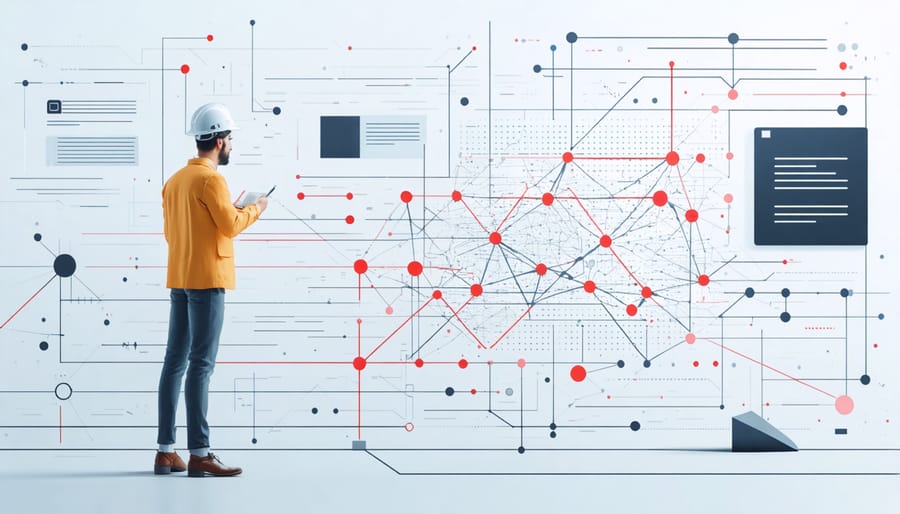Artificial intelligence is transforming the financial landscape of the construction industry, revolutionizing how firms manage their accounts, forecast cash flows, and optimize project budgets. As construction finance technologies evolve, AI-powered solutions are automating routine accounting tasks, reducing human error, and providing real-time financial insights that were previously impossible to obtain.
Machine learning algorithms now analyze vast amounts of historical project data to predict cost overruns, identify potential financial risks, and optimize resource allocation with unprecedented accuracy. From automated invoice processing to intelligent cash flow forecasting, AI systems are enabling construction finance professionals to shift their focus from data entry to strategic decision-making.
The integration of AI in construction finance represents a paradigm shift in how companies approach financial management, risk assessment, and compliance. By leveraging advanced analytics and predictive modeling, construction firms can now make data-driven decisions that significantly improve project profitability and financial performance. This technological revolution is not just about automation; it’s about transforming financial operations into a strategic advantage in an increasingly competitive market.
Real-Time Financial Analysis and Decision Making
Automated Cost Tracking and Analysis
AI-powered cost tracking and analysis systems are revolutionizing how construction firms manage their financial operations. These sophisticated platforms leverage machine learning algorithms to monitor project costs in real-time, enabling data-driven construction decisions that significantly improve project outcomes.
Modern AI systems can automatically categorize expenses, track labor costs, and monitor material usage across multiple projects simultaneously. By analyzing historical data patterns, these systems can predict cost variations and potential overruns before they occur, allowing project managers to implement preventive measures proactively.
The technology integrates seamlessly with existing accounting software, automatically processing invoices, purchase orders, and timesheets. This automation reduces manual data entry errors and provides real-time visibility into project finances. AI algorithms can identify cost anomalies and spending patterns that might go unnoticed in traditional accounting systems, helping firms optimize their resource allocation and improve profit margins.
Advanced analytics capabilities enable construction companies to benchmark costs across different projects, identify cost-saving opportunities, and generate detailed financial reports automatically. The system’s predictive modeling can forecast future expenses based on current trends, supporting more accurate budgeting and bid preparation.
These AI-driven solutions also facilitate better compliance management by automatically flagging transactions that deviate from established financial policies or regulatory requirements, ensuring proper cost allocation and reducing audit risks.

Predictive Cash Flow Management
Predictive cash flow management powered by AI represents a significant advancement in construction financial planning, enabling companies to forecast and optimize their cash positions with unprecedented accuracy. By analyzing historical project data, payment patterns, and market conditions, AI algorithms can generate detailed cash flow projections that account for various scenarios and risk factors.
Machine learning models excel at identifying patterns in payment cycles, supplier relationships, and project milestone completions, providing finance teams with actionable insights for better working capital management. These systems can predict potential cash shortfalls weeks or months in advance, allowing companies to take proactive measures such as adjusting payment terms or securing additional funding.
Recent implementations have shown that AI-powered cash flow forecasting can improve prediction accuracy by up to 95%, compared to traditional spreadsheet-based methods. Construction firms using these systems report a 30% reduction in late payments and a 25% improvement in working capital efficiency.
The technology also excels at analyzing external factors that impact cash flow, such as weather patterns, material price fluctuations, and labor availability. By incorporating these variables into forecasting models, companies can better prepare for seasonal variations and market changes that affect project timelines and costs.
For optimal results, construction firms should integrate AI cash flow management systems with their existing accounting software and project management platforms, creating a unified financial planning ecosystem that supports data-driven decision-making.
Risk Assessment and Fraud Detection
AI-Powered Risk Analysis
Modern AI algorithms have revolutionized financial risk management in construction projects by providing unprecedented analytical capabilities. These sophisticated systems process vast amounts of historical project data, market conditions, and real-time financial indicators to identify potential risks before they materialize.
Machine learning models now analyze patterns in cost overruns, payment delays, and material price fluctuations, enabling project managers to make data-driven decisions. By incorporating variables such as weather patterns, labor availability, and supply chain disruptions, AI systems can predict project-specific financial risks with remarkable accuracy.
Advanced neural networks evaluate contractor performance history, subcontractor reliability, and project complexity factors to generate comprehensive risk profiles. These systems continuously learn from new data, improving their predictive accuracy over time and adapting to changing market conditions.
Real-world applications have shown that AI-powered risk analysis can reduce unexpected costs by up to 15% and improve project timeline accuracy by 20%. The technology excels at identifying subtle correlations between seemingly unrelated factors that might impact project finances, such as regional economic indicators and specific construction methodologies.
For construction firms implementing these systems, the key benefits include early warning detection of potential cash flow issues, automated risk scoring for new projects, and dynamic adjustment of financial strategies based on emerging threats or opportunities.

Automated Fraud Prevention
Artificial Intelligence has revolutionized fraud prevention in construction finance by implementing sophisticated pattern recognition and anomaly detection systems. These AI-powered solutions continuously monitor financial transactions, invoices, and payment patterns to identify potential fraudulent activities before they impact the bottom line.
Modern AI fraud prevention systems analyze multiple data points simultaneously, including vendor payment histories, invoice amounts, project timelines, and material costs. By establishing baseline patterns for normal financial operations, these systems can quickly flag suspicious transactions that deviate from expected behaviors, such as duplicate payments, price inflation, or unusual payment timing.
Machine learning algorithms enhance fraud detection capabilities by adapting to new fraud schemes and improving accuracy over time. For construction companies handling large-scale projects, these systems can process thousands of transactions in real-time, significantly reducing the risk of financial losses due to fraud.
Key benefits include automated verification of payment requests, detection of altered documentation, and identification of suspicious vendor relationships. AI systems can also cross-reference historical data to verify the legitimacy of new suppliers and validate pricing against industry standards.
Construction firms implementing AI-based fraud prevention have reported significant reductions in fraudulent activities, with some organizations noting up to 60% decrease in unauthorized or suspicious transactions. These systems also provide detailed audit trails and compliance documentation, strengthening overall financial security and regulatory adherence.
Smart Contract Management and Automation
Intelligent Contract Analysis
Artificial Intelligence is revolutionizing contract analysis in the construction industry, offering powerful solutions for managing complex agreements and financial documentation. Advanced AI systems can now scan, interpret, and analyze construction contracts with remarkable accuracy, significantly reducing the time traditionally spent on manual review processes.
These intelligent systems employ natural language processing to identify critical contract elements, including payment terms, completion dates, performance requirements, and risk allocation clauses. By automatically flagging potential issues and inconsistencies, AI helps finance teams proactively address contractual risks before they impact project outcomes.
Recent implementations have shown that AI-powered contract analysis can reduce review time by up to 60% while improving accuracy rates to over 95%. The technology excels at standardizing contract language across projects, ensuring compliance with company policies, and maintaining consistency in financial terms.
For construction finance professionals, AI contract analysis tools provide real-time insights into payment schedules, change orders, and cost implications. These systems can automatically track contract modifications, update financial projections, and alert stakeholders to potential budget impacts. Additionally, machine learning algorithms continuously improve their accuracy by learning from each reviewed document, making the system increasingly valuable over time.
The technology also facilitates better collaboration between finance teams, legal departments, and project managers by providing a centralized platform for contract management and analysis.
Automated Payment Processing
Automated payment processing powered by AI has revolutionized how construction companies handle their financial transactions, particularly in managing contractor payments and invoicing workflows. These intelligent systems can process invoices by extracting relevant data through optical character recognition (OCR), validating payment information, and automatically routing documents for approval based on predefined rules.
Modern AI solutions can detect duplicate invoices, flag unusual payment patterns, and ensure compliance with contract terms by cross-referencing payment requests against established agreements. This significantly reduces the risk of payment errors and potential fraud while accelerating the entire payment cycle.
For construction firms managing multiple projects, AI-driven systems can automatically categorize expenses, match invoices to purchase orders, and track payment milestones across different job sites. The technology can also predict cash flow requirements by analyzing historical payment patterns and project schedules.
Leading construction companies report up to 80% reduction in invoice processing time and a 60% decrease in payment errors after implementing AI-powered payment systems. These solutions integrate seamlessly with existing accounting software and can handle various payment formats, from traditional invoices to digital payment requests, ensuring smooth operations across the entire payment ecosystem.
The system’s ability to learn from past transactions continuously improves its accuracy and efficiency, making it an invaluable tool for construction finance departments.
Future-Proofing Construction Finance
Integration with Building Information Modeling (BIM)
The convergence of AI-powered financial tools with Building Information Modeling (BIM) systems represents a significant advancement in construction financial management. This integration enables real-time cost tracking, automated quantity takeoffs, and precise financial forecasting directly linked to 3D model data.
Modern BIM-integrated AI systems can automatically extract cost-relevant information from model elements, including materials, quantities, and specifications. This capability dramatically reduces the time spent on manual takeoffs while improving accuracy. When combined with machine learning algorithms, these systems can analyze historical project data to predict costs, identify potential overruns, and suggest cost optimization strategies.
Financial managers can now leverage AI to monitor project costs against BIM models in real-time, tracking variations between estimated and actual costs at the component level. This granular visibility enables proactive financial decision-making and better cash flow management. The system can automatically flag discrepancies and suggest corrective actions based on learned patterns from previous projects.
For example, leading construction firms are using AI-BIM integration to automate payment applications by linking completed work in the model to financial documentation. The AI system validates progress claims against the BIM model, ensuring accuracy and reducing payment processing time by up to 60%.
Advanced analytics capabilities also enable scenario planning by simulating different design options and their financial implications. This allows stakeholders to make informed decisions about value engineering opportunities while maintaining project quality and performance requirements.

Machine Learning and Predictive Analytics
Machine learning algorithms and predictive analytics are revolutionizing how construction companies approach financial planning and risk assessment. These advanced AI applications analyze vast datasets of historical project information, market trends, and economic indicators to generate accurate financial forecasts and optimize project finance models.
By leveraging machine learning capabilities, construction firms can now predict cost overruns with unprecedented accuracy, often identifying potential issues months before they materialize. These systems analyze patterns in material costs, labor productivity, weather impacts, and supply chain disruptions to provide real-time financial insights and recommendations.
Predictive analytics tools are particularly valuable in bid optimization and resource allocation. They can analyze thousands of historical bids to determine optimal pricing strategies while considering current market conditions, competitor behavior, and project-specific risks. This data-driven approach has helped construction companies improve bid accuracy by up to 25% and increase project profit margins by 15%.
Advanced AI systems can also forecast cash flow requirements with greater precision, enabling better working capital management and reducing financing costs. By analyzing payment patterns, seasonal variations, and project milestones, these tools help construction firms maintain healthy liquidity positions throughout project lifecycles.
Recent implementations of these technologies have demonstrated significant ROI, with leading construction firms reporting improved project delivery times and reduced financial risks. As these systems continue to evolve, they’re becoming increasingly essential for maintaining competitiveness in the modern construction landscape.
The integration of artificial intelligence in construction finance represents a transformative shift in how companies manage their financial operations and decision-making processes. As demonstrated throughout this analysis, AI technologies offer substantial benefits, including improved accuracy in cost estimation, enhanced cash flow forecasting, and more efficient risk assessment capabilities.
Key implementation considerations for construction firms include careful evaluation of existing systems, thorough staff training programs, and a phased deployment approach. Success stories from industry leaders show that organizations achieving the greatest ROI have prioritized data quality, invested in comprehensive change management, and maintained clear communication throughout the implementation process.
However, construction companies must approach AI adoption strategically, considering their specific needs, resource constraints, and organizational readiness. A successful implementation requires strong leadership support, adequate technological infrastructure, and a clear understanding of how AI solutions align with business objectives.
Looking ahead, the construction industry can expect continued evolution in AI capabilities, with emerging technologies offering even more sophisticated solutions for financial management. Companies that begin their AI journey now, while maintaining a balanced approach to implementation, will be better positioned to leverage these advances and maintain competitive advantage in an increasingly technology-driven market.
The future of construction finance clearly lies in the strategic integration of AI solutions, balanced with human expertise and industry-specific knowledge. By carefully considering both the opportunities and challenges, construction companies can successfully harness AI to transform their financial operations and drive sustainable growth.

